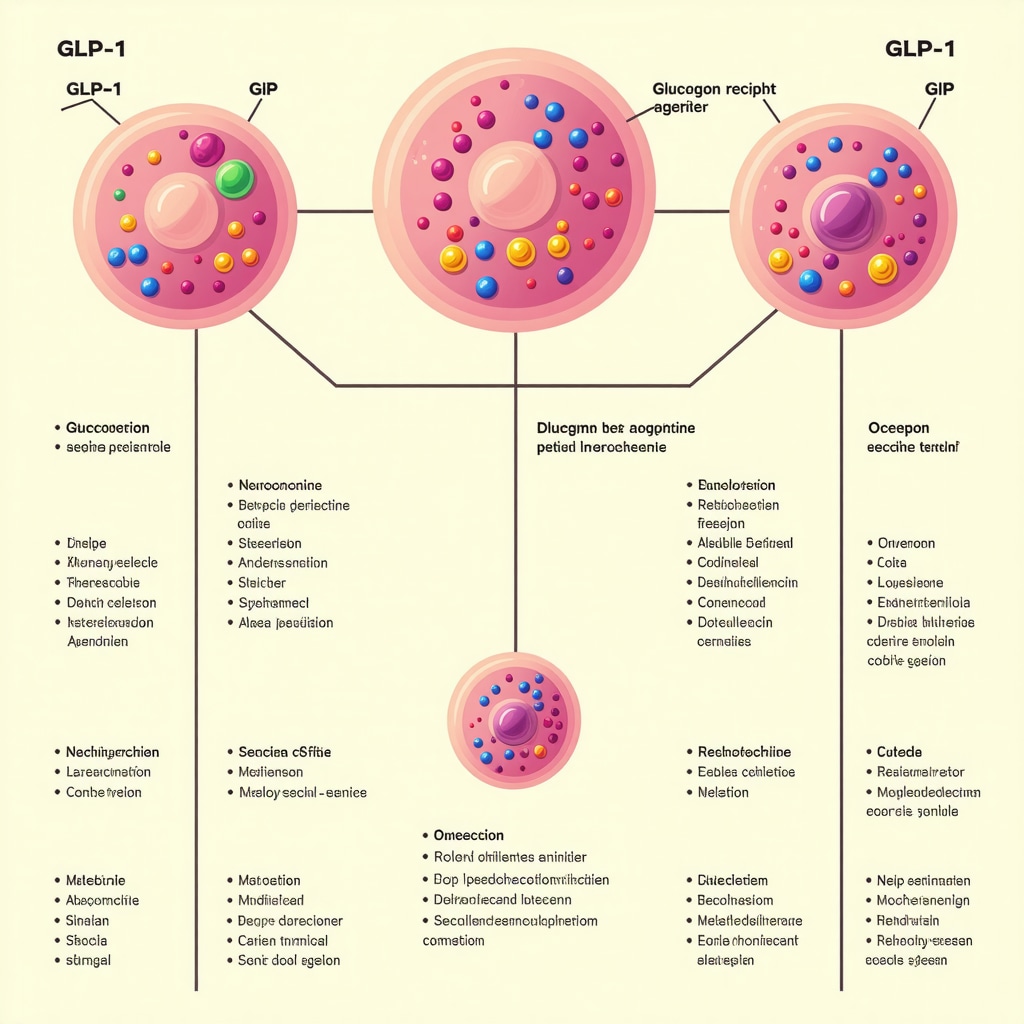Why Are Injectables the New Darling of Weight Loss?
Imagine walking into your doctor’s office and getting a quick shot that could help melt away stubborn fat. Sounds like science fiction? Not anymore. FDA approved injectable weight loss treatment options have stepped into the spotlight, captivating both medical professionals and hopeful patients alike. But before you rush to roll up your sleeve, let’s unpack what’s behind these modern marvels.
Injectables: More Than Just a Quick Fix?
Injectable treatments, primarily those targeting hormones like GLP-1, have revolutionized how we think about fat loss. These FDA approved options aren’t just about shedding pounds; they’re about reprogramming your metabolism, curbing appetite, and even improving metabolic health. It’s no wonder that these treatments are gaining traction as a preferred alternative to traditional weight loss methods.
What Makes These Injectables FDA Approved and Safe?
Safety is the golden ticket when it comes to any medical intervention, especially those promising weight loss. The FDA’s rigorous approval process ensures that these injectables have demonstrated significant efficacy and manageable side effects through extensive clinical trials. For instance, medications like semaglutide and tirzepatide have not only been cleared but celebrated for their robust results, often delivering double-digit percentage bodyweight reductions in study participants.
Which Injectable Treatments Are Leading the Charge?
At the forefront are GLP-1 receptor agonists such as semaglutide (marketed under names like Wegovy) and tirzepatide. These drugs mimic hormones that regulate appetite and insulin, effectively helping patients eat less and burn fat more efficiently. The emerging data and expert reviews, like those found in clinical studies published by the NIH, underscore their game-changing potential in obesity management.
Are You Wondering If Injectable Weight Loss Is the Right Choice for You?
That’s the million-dollar question, isn’t it? These treatments aren’t magic bullets; they require commitment, medical supervision, and lifestyle adjustments. But if you’re struggling with traditional diets and exercise alone, exploring FDA approved injectable options with a qualified doctor might be your next best step. For a personal touch, check out doctor-led fat loss plans that integrate these injectables with comprehensive lifestyle strategies.
Injecting Confidence: What You Need to Know Before Starting
Transparency is key. Side effects can include nausea, digestive discomfort, and sometimes more serious events, so a tailored approach under medical guidance is crucial. Don’t just take my word for it—consult with healthcare professionals who specialize in weight loss medications to find the safest and most effective plan for you.
Feeling curious or have your own injectable weight loss journey to share? Drop a comment below or explore more insights on FDA approved injectable weight loss treatments to stay informed and empowered.
Harnessing the Power of Personalized Injectable Weight Loss Plans
While injectable weight loss treatments like semaglutide and tirzepatide offer exciting prospects, their true effectiveness hinges on personalization. Every individual’s biology, lifestyle, and health history are unique, which means a one-size-fits-all approach falls short. That’s why doctor-led fat loss plans that incorporate these injectables with tailored nutrition, exercise, and behavioral strategies are becoming the gold standard. Such integrated plans, as explored in doctor-led fat loss plans personalized approaches, maximize results and safety by continuously adjusting treatment based on patient response.
Beyond the Basics: How Injectable Medications Influence Metabolism and Appetite
Injectables primarily targeting the GLP-1 receptor work by mimicking natural hormones that regulate hunger and glucose metabolism. But the ripple effects extend beyond appetite suppression. They improve insulin sensitivity, reduce fat storage signals, and even promote fat oxidation, thereby reprogramming metabolic pathways for sustained weight loss. According to a systematic review published in Frontiers in Endocrinology, GLP-1 receptor agonists also enhance cardiovascular health markers, which is crucial for the obesity population facing heightened cardiac risks.
Is Injectable Weight Loss Therapy Suitable for Patients with Complex Medical Histories?
This question is increasingly relevant as obesity often coexists with conditions like diabetes, hypertension, and sleep apnea. Injectable therapies, under expert supervision, can be tailored even for these complex cases, offering dual benefits of weight reduction and improved disease management. However, carefully weighing contraindications and monitoring side effects is essential. Collaborating with healthcare providers who specialize in doctor-led fat loss plans ensures that treatment plans are both safe and effective.
Integrating Injectable Weight Loss Treatments into Everyday Life
Adherence is a critical factor influencing injectable therapy success. Physicians often recommend stepwise dose escalations and provide comprehensive education on injection techniques and lifestyle modifications. Moreover, telemedicine platforms have revolutionized patient access to these treatments, allowing more consistent follow-ups and adjustments from the comfort of home, as detailed in how telemedicine weight loss treatment simplifies access to care.
For those interested in exploring these options further, consider reading more about FDA approved injectable weight loss treatments and their benefits. Do you have questions or personal experiences with injectable weight loss therapies? Share your thoughts in the comments below to help foster a knowledgeable community.

Decoding the Biochemical Symphony: How Injectables Orchestrate Metabolic Reprogramming
Delving deeper into the pharmacodynamics of FDA approved injectable weight loss agents reveals a sophisticated interplay of hormonal signaling and metabolic fine-tuning that extends well beyond simple appetite suppression. Semaglutide and tirzepatide, for example, engage GLP-1 and GIP receptors, respectively, triggering cascades that enhance pancreatic beta-cell function and increase energy expenditure. This hormonal crosstalk modulates key enzymes such as AMP-activated protein kinase (AMPK), a master regulator of cellular energy homeostasis, thus promoting lipolysis and mitochondrial biogenesis in adipose tissues.
Moreover, these agents alter hypothalamic pathways that integrate nutrient signals with satiety cues, effectively recalibrating the energy set point. The net effect is a sustained reduction in caloric intake without the compensatory metabolic slowing often observed with conventional dieting. This nuanced mechanism helps explain the superior weight loss outcomes and metabolic improvements seen in clinical trials.
How Do Injectable Weight Loss Medications Influence Neuroendocrine Regulation Beyond Appetite?
While appetite modulation is a cornerstone, injectable therapies exert broader neuroendocrine effects that improve glycemic control and lipid profiles. Through central nervous system pathways involving the arcuate nucleus and vagal afferents, these drugs impact stress responses and inflammatory cytokine production, which are pivotal in obesity-related insulin resistance. Emerging evidence suggests that GLP-1 receptor activation enhances cardiac function and endothelial health, thereby mitigating cardiovascular risks inherent to obesity.
Understanding these multifaceted effects is critical for clinicians tailoring interventions to patients with complex comorbidities, ensuring maximal benefit with minimal adverse effects.
Optimizing Patient Outcomes: The Role of Precision Medicine in Injectable Weight Loss Strategies
Personalization transcends lifestyle counseling; it involves leveraging genetic, epigenetic, and microbiome profiling to predict individual response to injectable therapies. For instance, polymorphisms in the GLP-1 receptor gene can influence pharmacokinetics and pharmacodynamics, dictating dosage adjustments and combination therapies. Additionally, integrating continuous glucose monitoring (CGM) and metabolic chamber assessments allows dynamic tracking of treatment efficacy, enabling real-time fine-tuning.
Such precision approaches are exemplified in multidisciplinary clinics where endocrinologists, dietitians, and behavioral psychologists collaborate to devise synergistic plans. These tailored regimens not only optimize weight loss but also enhance patient adherence and long-term metabolic health.
What Are the Latest Advances in Injectable Weight Loss Therapeutics Beyond GLP-1 Agonists?
Innovations are rapidly expanding the injectable landscape with dual and triple agonists targeting multiple incretin receptors, including GIP and glucagon receptors, aiming to amplify metabolic benefits. For example, tirzepatide’s dual agonism has set a new benchmark by achieving unprecedented weight loss and glycemic control simultaneously. Research into peptide analogs with extended half-lives and improved receptor specificity continues to evolve, promising more efficacious and tolerable options.
Moreover, adjunctive therapies combining injectables with agents modulating gut microbiota or brown adipose tissue activation are on the horizon, heralding a new era of comprehensive metabolic modulation.
For clinicians and patients eager to navigate this complex but promising terrain, staying abreast of cutting-edge research through trusted sources like the New England Journal of Medicine is invaluable.
Are you ready to explore how these advanced injectable treatments can be integrated into your personalized weight loss journey? Consult with specialized healthcare providers who can tailor these cutting-edge therapies to your unique metabolic profile and lifestyle needs. Your pathway to sustainable weight loss and improved metabolic health begins with informed, expert guidance.
Precision Medicine: Tailoring Injectable Weight Loss Treatments to Your Unique Metabolic Blueprint
Injectable weight loss therapies are no longer a one-size-fits-all solution. The future lies in precision medicine, which harnesses genetic, epigenetic, and metabolic data to customize treatment plans. For example, variations in the GLP-1 receptor gene can significantly influence how a patient metabolizes semaglutide or tirzepatide, affecting both efficacy and tolerability. By integrating continuous glucose monitoring and metabolic assessments, clinicians can dynamically adjust dosages and combinations, optimizing outcomes while minimizing side effects. This level of personalization is especially vital for patients with complex health profiles, ensuring that injectable regimens complement their overall metabolic status rather than disrupt it. For those interested in a comprehensive, doctor-led approach that embraces personalization, explore doctor-led fat loss plans which expertly combine injectable therapies with tailored lifestyle modifications.
Innovations on the Horizon: Beyond GLP-1 Agonists in Injectable Weight Loss
While GLP-1 receptor agonists have dominated recent advances, emerging injectable agents targeting multiple incretin receptors offer promising new avenues. Dual and triple agonists activating GLP-1, GIP, and glucagon receptors work synergistically to amplify satiety, enhance fat oxidation, and improve glycemic control. Tirzepatide exemplifies this breakthrough, delivering superior weight loss and metabolic improvements compared to single receptor agonists. Ongoing research is exploring next-generation peptides with longer half-lives and enhanced receptor specificity to improve patient adherence and minimize adverse effects. Additionally, combinatorial therapies that incorporate gut microbiota modulators or brown adipose tissue activators are under investigation, potentially ushering in a new paradigm of holistic metabolic reprogramming. For clinicians and patients eager to stay ahead, reviewing the latest clinical data in the New England Journal of Medicine provides invaluable insights.
How Can Neuroendocrine Interactions of Injectable Weight Loss Medications Influence Long-Term Metabolic Health?
Injectable weight loss agents extend their impact beyond appetite suppression by modulating neuroendocrine circuits that regulate stress, inflammation, and energy homeostasis. Activation of GLP-1 receptors in the central nervous system influences the hypothalamic-pituitary-adrenal axis, reducing cortisol secretion and attenuating chronic inflammation—key contributors to insulin resistance and obesity-related comorbidities. Furthermore, these medications improve endothelial function and cardiac output through vagal pathways, mitigating cardiovascular risks prevalent in obese populations. Understanding these complex neuroendocrine effects is critical for tailoring therapy duration and adjunctive interventions to sustain metabolic benefits and improve patient quality of life.
Have you experienced the transformative effects of injectable weight loss therapies or have questions about integrating them into your healthcare regimen? Share your thoughts and stories in the comments below to enrich our community dialogue. For personalized guidance on safely incorporating these advanced treatments, visit our detailed resource on doctor-led fat loss plans and take the next step toward sustainable metabolic health.

Expert Insights & Advanced Considerations
Precision Medicine Is Transforming Injectable Weight Loss Therapy
Injectable weight loss treatments like semaglutide and tirzepatide are no longer generic solutions. By integrating genetic, epigenetic, and metabolic profiling, clinicians can customize these therapies to individual metabolic blueprints, optimizing efficacy and minimizing side effects. This bespoke approach is critical for patients with complex comorbidities and those seeking sustainable outcomes, as detailed in doctor-led fat loss plans.
Neuroendocrine Modulation Extends Benefits Beyond Appetite Suppression
Beyond controlling hunger, GLP-1 receptor agonists influence neuroendocrine pathways that regulate stress, inflammation, and cardiovascular function. Their ability to reduce cortisol levels, attenuate chronic inflammation, and improve endothelial health positions them as multifaceted agents in combating obesity-related metabolic disorders. Understanding these mechanisms helps clinicians tailor duration and adjunctive therapies for long-term metabolic health.
Emerging Multi-Receptor Agonists Herald a New Era in Metabolic Reprogramming
Next-generation injectables targeting multiple incretin receptors—GLP-1, GIP, and glucagon—such as tirzepatide, demonstrate superior weight loss and glycemic control. The synergistic receptor activation enhances fat oxidation and energy expenditure, offering promising alternatives to single receptor agonists. Staying informed about these innovations helps patients and providers make cutting-edge treatment decisions, as explored in semaglutide vs tirzepatide comparisons.
Integrating Telemedicine Enhances Access and Treatment Adherence
Telemedicine platforms have revolutionized injectable weight loss care by enabling consistent follow-ups, dose adjustments, and patient education remotely. This accessibility supports adherence and personalized care, particularly for busy individuals or those in underserved areas. Learn more about this advance in how telemedicine weight loss treatment simplifies access to care.
Curated Expert Resources
- New England Journal of Medicine: An authoritative source for the latest clinical trial data and comprehensive reviews on injectable weight loss agents and emerging therapies.
- NIH Clinical Studies Database: Offers detailed, peer-reviewed research on GLP-1 receptor agonists and their metabolic effects, essential for evidence-based understanding.
- Doctor-Led Fat Loss Plans Portal: Provides expert-curated, personalized treatment frameworks combining injection therapies with lifestyle interventions for optimized outcomes (link).
- Telemedicine Weight Loss Treatment Guides: Resources explaining how virtual care models enhance injectable weight loss therapy safety and adherence (link).
- Comparative Reviews of Semaglutide and Tirzepatide: In-depth analyses detailing efficacy, safety, and patient suitability helping clinicians and patients choose the optimal injectable (link).
Final Expert Perspective
FDA approved injectable weight loss treatments represent a paradigm shift in obesity management, moving beyond simple appetite suppression to comprehensive metabolic reprogramming through precision medicine and neuroendocrine modulation. The evolving landscape, enriched by multi-receptor agonists and telemedicine integration, offers unparalleled opportunities for personalized, effective, and sustainable fat loss strategies. For those embarking on this journey, partnering with specialized healthcare providers who offer tailored, doctor-led fat loss plans ensures safety and maximizes benefits. Engage with the advanced resources and share your experiences to contribute to a growing community dedicated to innovative, expert-guided weight loss solutions.
Ready to take your injectable weight loss journey to the next level? Explore expert-led plans and connect with professionals at doctor-led fat loss plans or contact us for personalized guidance tailored to your unique metabolic profile.

I’ve been following the developments in injectable weight loss treatments like semaglutide and tirzepatide, and it’s impressive how much they can do beyond just appetite suppression. The neuroendocrine effects, especially their impact on inflammation and cardiovascular health, seem to offer broader benefits than traditional diets or exercise alone. However, I wonder how these therapies are being tailored for patients with complex health issues like diabetes or heart disease. From my experience working with patients managing multiple conditions, personalized plans are essential. Has anyone here had success with these treatments alongside managing other health conditions? Also, I’m curious about the long-term safety and whether continuous use might have unforeseen effects on metabolic functions. It’s an exciting area, but I think ongoing monitoring and personalized medicine will be key for sustainable results.
This post sheds a lot of light on how injectable treatments like semaglutide and tirzepatide are truly transforming obesity management. I’ve seen firsthand how personalized plans incorporating these injectables, along with lifestyle modifications, can lead to impressive results, especially for patients with complex conditions like diabetes. One aspect I find particularly interesting is how these therapies don’t just focus on weight loss but also bring broader metabolic and cardiovascular benefits, which is promising for long-term health. However, I do wonder about accessibility—are these treatments becoming more widely available beyond specialized clinics, and what’s their cost-effectiveness in the long run? Also, from your experience, how do clinicians balance the neuroendocrine effects with potential side effects like nausea or gastrointestinal issues? This evolving treatment landscape is exciting, but it seems like the success hinges on careful patient selection and ongoing monitoring. Would love to hear more about how practitioners are tailoring these therapies for patients with multiple health challenges.
This article provides a very comprehensive overview of FDA-approved injectable weight loss treatments and how they are reshaping obesity management. I appreciate the emphasis on personalization and the role of neuroendocrine modulation, which are crucial for maximizing efficacy and safety. From my experience in clinical practice, one of the biggest challenges is managing patient expectations and ensuring adherence, especially considering possible side effects like nausea or gastrointestinal discomfort. It’s encouraging to see the focus on multidisciplinary, doctor-led plans that incorporate lifestyle factors alongside medication. Has anyone found effective ways to monitor long-term metabolic health once patients start these injectable therapies? Also, with the rapid advancements in dual and triple receptor agonists, how do practitioners decide which combination offers the best benefits for patients with different health profiles? I believe ongoing research and personalized approaches will be key in advancing these treatments further.